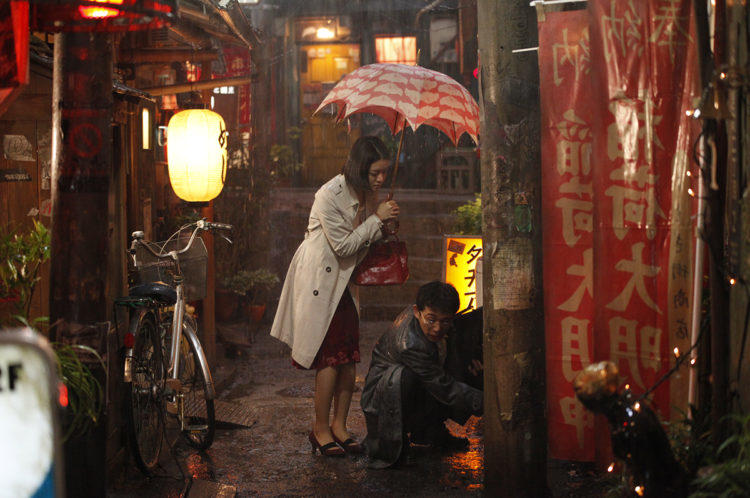
In anime, you sometimes see a protagonist who wants nothing more than a quiet, average life only to be plunged into some sort of drama or misadventure. Usually, the character learns they enjoy a more-than-average life.
American society also frowns on a quiet, average life. Media teems with stories of people traveling, doing extreme sports, driving fast cars, doing this and that. Education and culture pushes us to be ambitious, to hunger to be rich and successful. To “live the dream.” You aren’t supposed to be content in your job or with your small house or otherwise quiet, boring life. You need to travel! You need to make bank! Eat at expensive restaurants. Climb that corporate ladder. Work and don’t be lazy. Live up to your potential.
Behind all these messages sits the idea that if you are content and don’t want to climb to higher paid jobs with more responsibility, you are being lazy and less a person. It’s somehow wrong to be satisfied with a job that meets all your needs and grants you free time. You are supposed to want more.
You are being scammed by these ideas.
Epictetus wrote: “Wealth consists not in having great possessions, but in having few wants.” This idea extends to experiences. People accumulate experiences as if they are objects. Miyamoto Musashi also agrees: “Be detached from desire your whole life long.” Contentment means you learn to be satisfied with your life in the present moment. You don’t grasp or want more. Of course, when something better comes along, there’s nothing wrong with taking it. but desiring that something (whether it is a job, a home, a spouse, an experience) leads to discontentment.

Much of our discontentment comes from comparing ourselves to others. This natural inclination doesn’t work toward a peaceful life. It’s based on misconception. After all, the person you compare yourself with, and measure up short against, could well be doing the same toward you and measuring short against you. We cannot know the inner state of another. Most often, an outwardly desirable life has the same problems and concerns as your own. Bushido captures this idea: “I know not how to surpass others; I only know how to outdo myself.” To grow oneself without threatening contentment means you only measure yourself against yourself while realizing your efforts are where they need to be right now. Musashi also wrote: “Never be jealous of others, either in good or in evil.”
The average, quiet life is superior to all the grand, ambitious lives media shows because such a life offers the best chance to detach from desire. Such grand lives strive and fret. The greatest treasure of life remains available to everyone: time. Grand lives often spend their time striving after prestige and money, little different from the poor. But when your life needs have been met, why spend more of your irredeemable time striving for more? If you have financial security, more money and more things don’t create more happiness. Rather, happiness comes from having more time to use as you desire. Quiet use of time, that is time that doesn’t draw attention to you, can be the most rewarding. Contentment leads you to enjoy the simple, imperfectly perfect parts of life, like walking down a street or trail.
When considering taking on a new job or a side-hustle, you have to consider more than money, especially once you are financially stable–that is, you have savings and investments and little-to-no debt. I like to ask myself if the job will take up more of my free time. Now, a new job may have the same hours as your current job, but if it impacts your availability of time, such fragmenting it too much, the pay may not be worth it. After all, unlike money, your time remains limited. A Japanese proverb comes to mind: “The deepest rivers run slowly.” A quiet, average life that doesn’t chase ambition but instead focuses on maximizing available time has the best chance to become a deep river.

Of course, securing more time means little if you don’t use it well. Video games and entertainment have their place, but a quiet, average life well-lived demands the pursuit of creative interests but without grasping after success as defined by a materialistic society.
Philosophers define a quiet, unambitious life as a virtuous life, grounded in wisdom. While having wealth isn’t wrong, having more possessions and more difficult work adds complication. And complication muddies the mind. Yagyu Jubei Mitsuyoshi stated: “The undisturbed mind is like the calm body of water reflecting the brilliance of the moon. Empty the mind and you will realize the undisturbed mind.”
Seneca also offers insight in favor of the quiet life: “People are frugal in guarding their personal property; but as soon as it comes to squandering time they are most wasteful of the one thing in which it is right to be stingy.”
So when you consider life changes, ask yourself “does this give me more time?” More money doesn’t equate a better life once you’ve achieved financial stability. More things do not make for a better life. A quiet, average life, lived with contentment and a wise use of time–pursuing your creative interests and learning–stands superior against the YOLO life media pushes. Don’t misunderstand. Wanting some betterment isn’t wrong; ambition and striving creates discontent, however. Contentment involves learning to be satisfied with what you already possess:
This is the substance of the Way of the Samurai: if by setting one’s heart right every morning and evening, one is able to live as though his body were already dead, he gains freedom in the Way. his whole life will be without blame, and he will succeed in his calling. –Yamamoto Tsunetomo
So my suggestions for a quiet, average life:
- Gain financial stability by reducing your consumption.
- When considering work or any commitment, consider how it impacts your time.
- Time is scarce; money is not.
- Learn to be content with what you have.
- Compare yourself only with yourself.
- Improve yourself, but don’t chase it.
- Learn to love the small things; notice them.
- Be mindful of how you give your time to others.
- Be mindful of your mind.
- Disconnect from media regularly.
There’s no shame in not pursing high-paying jobs that consume too much time. There’s no shame in preferring to stay home to read or watch anime or draw. Contentment finds happiness in the now. Even if you would travel to Japan or anywhere else, you bring yourself with you. If you aren’t content where you are now, you won’t be content anywhere else either. Granted, if you are in a difficult situation contentment may be a long way off. All you can do is what you can do.
As a samurai, I must strengthen my character; as a human being I must perfect my spirit –Yamaoka Tesshu




“But when your life needs have been met, why spend more of your irredeemable time striving for more?” – because of the need to compare yourself to others and seeing that others have it more than you. Well, the general message being pushed by modern culture.
Someone I listen to on a regular basis said it best, “Dare to be average.” Everyone’s taught that they’re special that it can negatively affect those who struggle with self-esteem and comparison.
I also know another quote about being average. If you’re going to be the average of something, make sure you’re the average of some very good people.
You caught the answer I was suggesting with that question :). Comparing yourself to others is what keeps the economic gears turning, and it keeps us unhappy.
Oh! I like that: “Dare to be average.”
Reminded me of Seneca’s words to a traveling Lucilius from the “Epistulae Morales ad Lucilium”, XXVIII, 5th passage, “…you are not journeying; you are drifting and being driven, only exchanging one place for another, although that which you seek, – to live well, – is found everywhere.”
Good suggestions in general, I think… regardless of how one lives a life.
That said, I feel like it all starts at #9. It takes a significant willingness and a commitment to being alone with one’s self to discern the noise from the message; though it’s probably easier for some than for others. There are many ways to live a fulfilling life.
Seneca’s letters are great reads. Seneca’s awareness of his own hypocrisy is interesting.
I considered making #9 the first suggestion, but understanding the mind requires space and stability before you can begin. If only society wouldn’t sell one way to live a fulfilling life, people wouldn’t be so neurotic trying to make themselves fit a form of success that works against their nature.